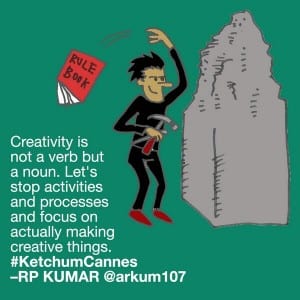 Coming to Cannes and being inspired by the award-winning work – more than 1,000 Lions in 17 categories – is like diving into the deep end of a giant pool full of options and opportunities. You emerge with a new idea of what´s possible and how far you can go. Every winner at this year’s festival has been inspiring in its boldness, holding a crystal-clear idea at its center and showing a willingness to break with the status quo.
Coming to Cannes and being inspired by the award-winning work – more than 1,000 Lions in 17 categories – is like diving into the deep end of a giant pool full of options and opportunities. You emerge with a new idea of what´s possible and how far you can go. Every winner at this year’s festival has been inspiring in its boldness, holding a crystal-clear idea at its center and showing a willingness to break with the status quo.
When festival participants return home and are seated at their desks, surrounded by the usual frameworks, regulations and constrictions, their experience here should energize and strengthen them to overcome mental barriers, defend their ideas and hold strong against too many compromises. In particular, the PR work among the award winners and at the festival in general reflects the enormous level of creativity in our discipline. So it is really worth the trip – for agencies, for companies and for brands.
But I have to say – and this is especially true for PR – that there is some creativity that you will never see at Cannes. It’s the kind of work that is very important to our industry, and it should not be forgotten or overshadowed by the glamour of the festival.
Several years ago, IBM (client) unveiled a study showing that CEOs see creativity as one of the most important leadership skills for overcoming complexity and business challenges. This is the kind of creativity that doesn’t turn up at Cannes, but it’s just as relevant to a company’s success as the flashier award-winning campaigns. Creativity isn’t only about aesthetics and visual effects or timely, smart executions that spark conversations. The world’s business leaders also ask for creativity and ideas to cope with complex situations such as earning trust among shareholders, backing up financial and investor relations, managing reputation among the public and politicians, engaging in legal issues, gaining trust with employees, and crisis and issues management.
Of course, all these challenging assignments call for sound strategy, but they also need new and fresh ideas – ideas that break through “business as usual” to make themselves heard and cause effective change. The Ketchum Leadership Communication Monitor is a recently published study that asked more than 6,500 people in 13 countries on five contents about their views on leadership and communication. One of the most important findings is that it’s about key actions, not just key messages. It’s crucial to say what you will do, do what you say and acknowledge what you’ve done to light the path to leadership credibility — especially in a crisis, where operationalizing empathy wins the day.
Helping leaders and managers with creative ideas to cope with these kinds of challenges is a key part of public relations. While this type of work will never make it to Cannes, it is still worth celebrating.
Stay up-to-date with the scene at Cannes by subscribing to our “Scene @ Cannes” blog feed here or viewing our social stream here.


